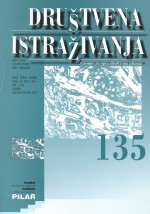Emotional Competence and Combat-Related PTSD Symptoms in Croatian Homeland War Veterans
Emotional Competence and Combat-Related PTSD Symptoms in Croatian Homeland War Veterans
Author(s): Martina Knežević, Dino Krupić, Sandra ŠućurovićSubject(s): Military history, Personality Psychology, Studies in violence and power
Published by: Institut društvenih znanosti Ivo Pilar
Keywords: war veterans; dysphoria; re-experiencing; emotional competence; PTSD symptom clusters; Croatian Homeland War;
Summary/Abstract: This study examined the relationship between four factors of posttraumatic stress disorder symptoms – re-experiencing, avoidance, dysphoria and hyperarousal – and particular domains of emotional competence and emotional regulation and control among 215 Croatian Homeland War veterans. Cross-sectionally, emotional competence subscales – perceiving and understanding emotions, expressing and labelling emotions, managing and regulating emotions – were associated with dysphoria symptom cluster only, while emotional regulation and control subscales – influence of emotion and mood on memory and emotional reaction control – were associated with dysphoria and re-experiencing symptom clusters. The results of this study are consistent with the view that successful recovery from trauma requires adaptive emotion competence skills and that therefore difficulties in dealing with emotions (understanding, expressing or regulating) are a risk factor for the development and/or maintenance of posttraumatic stress disorder symptoms. It appears that interventions organized toward improving emotional competence and regulation may be useful as complementary or independent treatments for combat-related posttraumatic stress disorder.
Journal: Društvena istraživanja - Časopis za opća društvena pitanja
- Issue Year: 26/2017
- Issue No: 1
- Page Range: 1-18
- Page Count: 18
- Language: English

